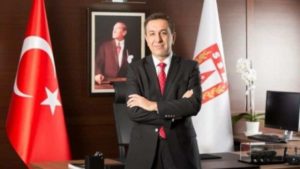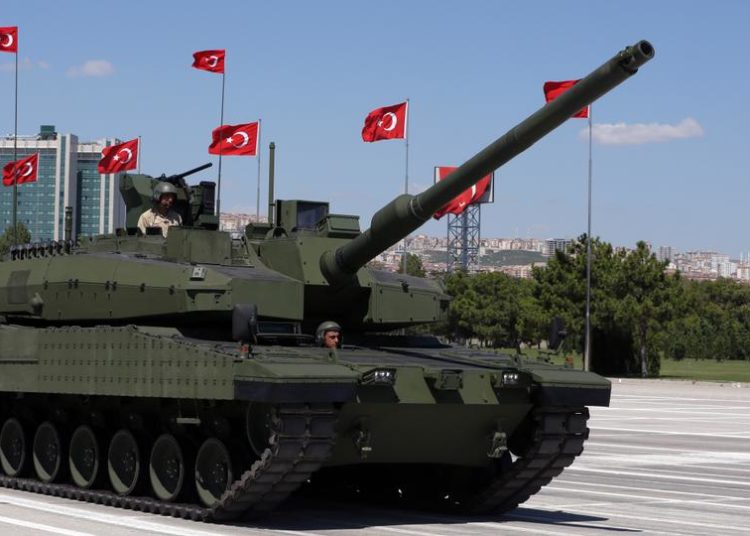Levent Kenez/Stockholm
It was revealed once again that no progress has been made in the production of the Altay tank, known as Turkey’s indigenous battle tank, during a parliamentary committee meeting last week at which the financial reports of state-owned companies were discussed.
Deputy Minister of Defense Muhsin Dere, who joined the session dealing with the state-owned Military Factory and Shipyard Operation (ASFAT), replied to questions from opposition lawmakers who criticized the government for the delay.
Blaming the Germans, Dere claimed that the German company which had supplied the power system for a prototype previously produced by the private Otokar company stopped supplying it when the project reached the stage of mass production.

Noting that efforts for the production of a local engine and transmission system in Turkey are continuing, the deputy minister stated that they are also negotiating to purchase the power system from South Korea. Stating that there are also negotiations in the United States, Dere said, “However, at the moment, we do not have an engine and transmission system. This is why there’s no tank.”
However, he stated that the second generation Altay prototype was produced at a tank and pallet factory in Sakarya with the power system previously purchased from Germany, adding that it passed performance tests successfully. In other words, the national tank has no shortcomings other than the engine and transmission system.
Turkey announced last year that it had started to manufacture a 1,500 horsepower tank engine, with videos of the engine presented to the press. However, experts emphasize that accomplishing the transfer of engine power to the tank will take a long time.
BMC, the main contractor for the project, is currently in talks with Korean engine-maker Hyundai Doosan Infracore and S&T Dynamics, which produces automatic transmissions.
In May İsmail Demir, head of the Presidency of the Defense Industry, stated that the tests of the power system supplied from Korea for the Altay project were continuing. He told Turkish media that if the tests are successful, mass production will start. However, he said the ultimate goal is to mount the domestic equivalent on the tank.
Military experts state that Turkey can start mass production after solving this problem, but the uncertainties experienced by BMC, the shortage of cash and allegations of corruption make it difficult to achieve this.
In 2017 Turkish President Recep Tayyip Erdoğan declined an offer from Otokar, which had already produced a prototype and was ready for mass production; yet he contracted another company owned by a businessman in his close circle, sparking a great deal of controversy.
It was no secret that there were serious delays in the project due to the German government’s undeclared embargo that started in reaction to Turkey’s military interventions in Syria in recent years. While the Turkish government engaged in intense diplomacy to persuade the Germans, negotiations were started with Korean companies as an alternative. Turkish Defense Minister Hulusi Akar clarified in December that German company Rheinmetall will not take part in the project.
Akar argued that the best solution for the project was to use German technology, following a meeting with German Defense Minister Annegret Kramp Karrenbauer in February 2021 in Berlin. “The Altay was developed based on a German engine. Finding an alternative engine from another country and integrating it into the tank is not a simple matter. The design of the tank needs to be changed. Therefore, the most appropriate solution would be the procurement of the German power system.”
According to the Altay deal in 2018, the first tank was expected to roll off the assembly line within 18 months and be delivered to the Turkish Land Forces by BMC. The contract included mass production and life-cycle logistical support for 250 units. After the signing of the Altay project with BMC in 2018, the government was accused by opposition groups of favoring a Turkish-Qatari joint venture owned by Turkish businessman Ethem Sancak, a former executive board member of the ruling Justice and Development Party (AKP), and the Öztürk family, distant relatives of President Erdoğan, as well as Qatar. A full 49.9 percent of BMC’s shares belong to Qatar, while Sancak owns 25 percent and the Öztürk family holds 25.1 percent.
The Altay project is Turkey’s first main battle tank development program, which includes electronic command and control systems, a 120-millimeter gun and armor, all of which will be made by Turkish defense contractors. The Altay project has been beset by critical technology problems that have impacted its production timeline.
President Erdoğan has announced several times that mass production of the Altay tank would begin shortly, pointing to various dates. Visiting the BMC factory on July 2, 2021, Erdoğan said he talked to the software engineers and received a promise from them that production could start in 2023. However, the engine and transmission are the problems with the tank, not the software.












